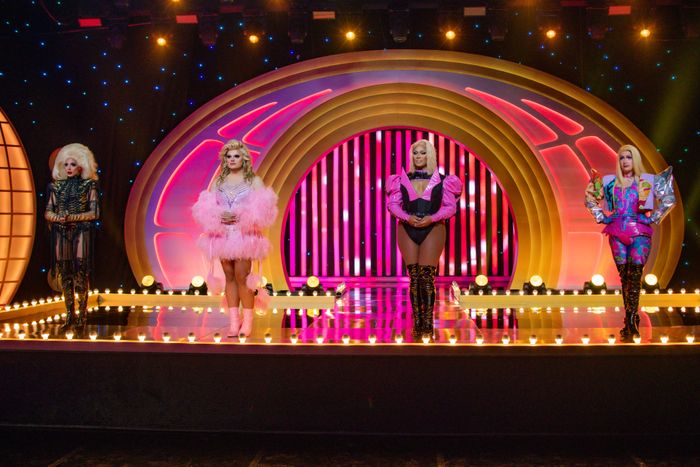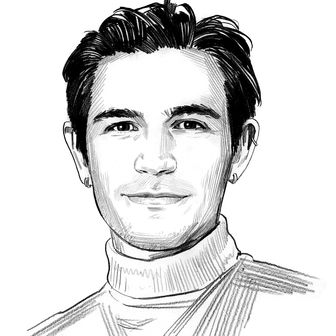
Spoilers ahead for the finale of RuPaul’s Drag Race Global All Stars’s first season, including the winner.
RuPaul’s Drag Race has long fashioned itself as the “Olympics of drag” with RuPaul and the queens themselves using the phrase as a stakes-raising metaphor. But now, for the first time, the franchise put together a season that is a literal translation of the Olympics. Global All Stars has a premise so obvious you almost can’t believe it hasn’t happened before: Take one queen from each of the Drag Race franchises across the world and have them compete to determine the world’s one true queen. When the cast was announced, it seemed like the makings of a stellar season with all but two queens having been finalists in their respective franchises (and of the two non-finalists, one was Alyssa Edwards). So why did the inaugural Global All Stars flop so spectacularly?
For starters, there is the unfortunate fact that Drag Race’s purported celebration of global drag culture has been covered by an icky sheen of xenophobia all season long with the dominant fan response being not excitement but outrage over the treatment of queens for whom English is a second language. While questions of inter-queen bullying have arisen, the most obvious culprit has been RuPaul herself, who picked her favorites fast and early: Prior to the finale, Drag Race: Down Under’s Kween Kong and Drag Race UK’s Kitty Scott-Claus won three challenges apiece, Alyssa won two, and nobody else scored more than one. RuPaul always has her favorites, and that was true both during the show’s classic seasons of yore and the good seasons that have come out more recently. What’s unfortunate is that her favorites this season are all just the queens she already knew, from franchises she hosts, and thus make up the majority of the contestants who speak English as a first language.
But the issue is not so simple as “RuPaul doesn’t like ESL queens.” Maybe that’s true, but this season’s underlying problem is not just a problem of biases; it’s that those biases are expressed through the expectation of branding. RuPaul’s Drag Race, emphasis on RuPaul, is a competition about self-promotion and personal branding, and “personal branding,” for a drag queen, requires a reduction of the self to as few adjectives as possible. Skill sets are important, yes, but so is being able to define yourself quickly. That’s why season 16’s Q had to be cut before the finale: She was a queen with a remarkable skill set but whose “brand” was virtually nonexistent. The character you play onstage while on Drag Race needs to be immediately apparent and consistent. The issue with Global All Stars, then, becomes a little more clear: RuPaul, and by extension the show, sees each queen’s nationality as their defining feature and expects them to perform that national identity as their brand.
This isn’t to say the ESL queens don’t see themselves as brands. They have all gone through the Drag Race machine before, if not the RuPaul-specific arm of it, so they knew what awaited them walking into the Werk Room. It’s just that, in their original season, in their home country, their nationality was not interesting enough to be part of their brand. Suddenly, in a season hosted by an American, they are being forced to alter their branding to fit an American stereotype of their nation.
This most clearly happened to Nehellenia, who, after Kitty joked about her saying margherita pizza in an Italian accent, smartly retconned a margherita-pizza bit into her act to appease RuPaul, even if she fundamentally didn’t understand why it was funny.
And the truth is that it’s not funny! On Drag Race Italia, Nehellenia was known for being weepy — something that, on a U.S. All Stars, would be good fodder for self-deprecating humor — and obsessed with the moon. On Global All Stars, the moon came up for the first time during the makeover challenge, when there were just six queens left. Nehellenia’s makeover looks used preplanned outfits from before she came on the show, and they were clearly intended to capture a part of her branding that there has been no space for here. Notably, that challenge nabbed her her only win.
Nehellenia became the sole contender to beat the odds this season, becoming the only ESL queen to make it into the finale and never fall into the bottom on any comedy challenges. Part of that, though, was due to her (admirable) willingness to cave to Ru’s whims, saying margherita pizza at any point available to her. But perhaps the best illustration of Global All Stars’s reliance on national stereotypes was the Snatch Game, in which the majority of the queens played a character that functioned as a synecdoche for their entire country: Kitty, from the U.K., won with Princess Diana; Nehellenia was well-reviewed for her Valentino; Pythia, a Greek expat to Canada, received raves for her Zeus; and Alyssa was safe doing Annie Oakley. Meanwhile, both queens who ended up in the bottom two got there by playing characters who are famous in their home countries but not to RuPaul: Mexican queen Gala Varo played actress Laura León, and Sweden’s Vanity Vain played Eurovision’s Loreen. The queens who did well knew what they had to do: play into RuPaul’s conception of their home country by playing folk heroes, mythological figures, and national icons. Specificity, usually the lifeblood of the impression drag that Snatch Game asks for, became irrelevant.
Listen, RuPaul has always loved ethnic stereotypes. She loved them when she gave Manila Luzon a challenge win for using a Pan-Asian accent during season three, and she loved them 11 years later when she all but forced Irish queen Jonbers Blonde to play a leprechaun on Drag Race UK’s fourth season. Remember on season 16 when Plane won Snatch Game with a European pop star that Ru had never heard of? To do so, she had to avoid any references to Jelena Karleuša’s actual career and instead just play her as a vague, Slavic pop star. Michelle thought the character was made-up! That’s how you win with something Ru doesn’t know — you turn it into something she does know. And what does she know and love? Stereotypes.
The issue, then, with Global All Stars is that the queens can’t succeed by playing on cultural references that make sense within their home country. No, they have to play on RuPaul’s American knowledge of their countries’ references, which is not necessarily part of their drag persona. Think of how few American queens really grapple with “America” as a concept. Alyssa, for what it’s worth, is a good pick for this season because she’s altogether likely to dress up like an American flag anyway. But imagining iconic queens from her season like Alaska, Jinkx, or Detox having to reshape their drag around an American stereotype shows how bad of an idea this is. Those queens have brands, but their national identity is not part of them.
This isn’t to say the blame for the season’s issues lies exclusively with RuPaul. Yes, Kween and Kitty were routinely dismissive of the ESL queens. At the same time, why wouldn’t they be? They were consistently told by the judges that they were the queens that mattered, and this is basically the Stanford prison experiment already. And, yes, the comedy challenges were wildly biased toward the queens who spoke English as a first language. But why wouldn’t they be? That’s been a problematic hurdle for Puerto Rican queens on U.S. Drag Race since Nina Flowers said HIV instead of hit TV on season one.
In the end, Alyssa winning the first (and only?) Global All Stars was the only conclusion that made any sense: Fans had fully turned on Kitty and Kween for their comments toward Nehellenia (along with Kitty’s un-called-out basic and dowdy outfits throughout the season), and despite being a powerful underdog throughout the season, Nehellenia just didn’t have the track record to justify a full win. Instead, the richest, most successful, most well-known queen walking into the season pulled out the win. It feels like an anticlimax. Alyssa is one of the most beloved queens in the entire world, but she also walked into the season with advantages galore, and nobody was able to gain enough steam to oppose her. Her win doesn’t feel like a celebration of a worldwide superstar — it feels like an apology for a season that will quickly be forgotten.


